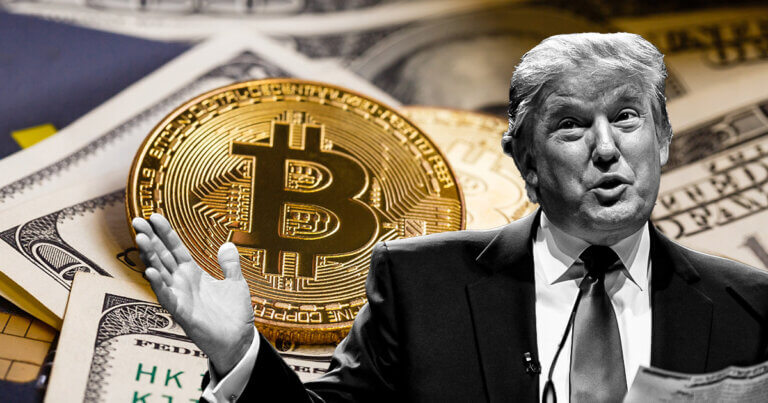 Trump could be considering Bitcoin as a reserve asset to join the ‘SoftWar’ road to $1 million
Trump could be considering Bitcoin as a reserve asset to join the ‘SoftWar’ road to $1 million Trump could be considering Bitcoin as a reserve asset to join the ‘SoftWar’ road to $1 million
Bitcoin advocate Jason Lowery engaged by Trump campaign on national security strategy

Cover art/illustration via CryptoSlate. Image includes combined content which may include AI-generated content.
Jason Lowery, the author of “SoftWar: A Novel Theory on Power Projection and the National Strategic Significance of Bitcoin,” revealed at the start of June that members of Donald Trump’s campaign administration have contacted him regarding his expertise on Bitcoin.
“I can confirm that I have been reached out to by folks from Trump’s campaign administration about you-know-what. I told them I’m ready and willing to move to DC if called upon.”
In his communications, Lowery stressed the importance of Bitcoin for national security and its strategic significance for the US military, particularly in defending and securing cyberspace. He suggested the formation of a “US Hash Force” and discussed the potential establishment of a new government agency to oversee Bitcoin-related initiatives.
Lowery proposed that agencies such as the Department of Energy (DoE) and the Department of Defense (DoD) would be involved. Specifically, he recommended that either the US Cyber Command (USCYBERCOM) or the US Strategic Command (USSTRATCOM) establish a Combined Hash Force Component Command (CHFCC).
“In my thesis I recommend that either USCYBERCOM or USSTRATCOM should have a Combined Hash Force Component Command (CHFCC) involving FVEYE & NATO countries.”
This command would collaborate with FVEYE and NATO countries to counteract similar efforts by Russia and China in the evolving digital warfare landscape, which he terms the “#Softwar.”
A few days later, Lowery cryptically announced, “Let the #softwar begin 🇺🇸🦌
🫡🤫👋” and subsequently declared he would be “going dark,” implying a period of reduced public communication or increased secrecy.
Lowery emphasized his political neutrality, asserting that he supports any Commander-in-Chief and does not endorse any political party. He clarified that only the Trump campaign had reached out to him.
Bitcoin as a reserve asset in the US
More recently, in reply to Dylan LeClair sharing a Forbes article highlighting Trump’s discussions on Bitcoin as a strategic reserve asset, Lowery responded with a suggestive wink emoji, indicating his awareness and possible involvement in these high-level strategic conversations about Bitcoin’s future role in national security and economic policy.
In the article, Sam Lyman, the public policy director at Riot Platforms, discusses the emerging political discourse surrounding Bitcoin as a potential strategic reserve asset. This conversation has been notably propelled by former President Donald Trump’s vocal support for Bitcoin on his campaign trail. Trump’s comments highlight the geopolitical implications of Bitcoin, suggesting that policies limiting its use would inadvertently benefit adversaries like China and Russia.
Lyman comments that Trump is not alone in this stance. Figures such as former presidential candidate Vivek Ramaswamy and Senator Cynthia Lummis have also advocated for the strategic integration of Bitcoin into the US financial system. Ramaswamy has proposed backing the dollar with a basket of commodities, including Bitcoin, to combat inflation, an idea that mirrors a similar proposal by Independent candidate Robert F. Kennedy Jr.
The article also features insights from Alex Thorn of Galaxy Digital, who highlights the potential for Bitcoin to play a significant role in global finance. Thorn argues that as Bitcoin becomes more integrated into institutional portfolios and corporate balance sheets, it could similarly be adopted by nation-states.
Lyman shared commentary from Lummis stating that the United States, currently the largest holder of Bitcoin among nation-states, could further leverage this position by officially recognizing Bitcoin as a strategic reserve asset. Lummis believes that this move could spark a global race among countries to secure Bitcoin, amplifying its role in international trade and geopolitics.
Lyman highlights the potential benefits of such a strategy through the success stories of MicroStrategy, a company that revitalized its fortunes by investing heavily in Bitcoin, and El Salvador, which has seen significant returns on its Bitcoin investments since making it legal tender.
Ultimately, Lowery’s comments that he went “dark” a month ago and his recent cryptic response to one post about Bitcoin being considered a reserve asset raise questions about whether Lowery has indeed been in DC discussing Bitcoin with political parties. Further, Lowery had previously deleted any posts related to Bitcoin from his X account within 48 hours. However, these recent posts have remained since June 8.
According to Lowery, Bitcoin could reach $1 million per coin as the next step in the SoftWar if and when the US accepts it as a weapons system rather than simply a peer-to-peer currency.
Mentioned in this article
 Bitcoin
Bitcoin  Riot Platforms
Riot Platforms  Galaxy Digital
Galaxy Digital  Donald Trump
Donald Trump  Jason Lowery
Jason Lowery  Cynthia Lummis
Cynthia Lummis  Vivek Ramaswamy
Vivek Ramaswamy  Robert F. Kennedy Jr.
Robert F. Kennedy Jr. 


















































































































